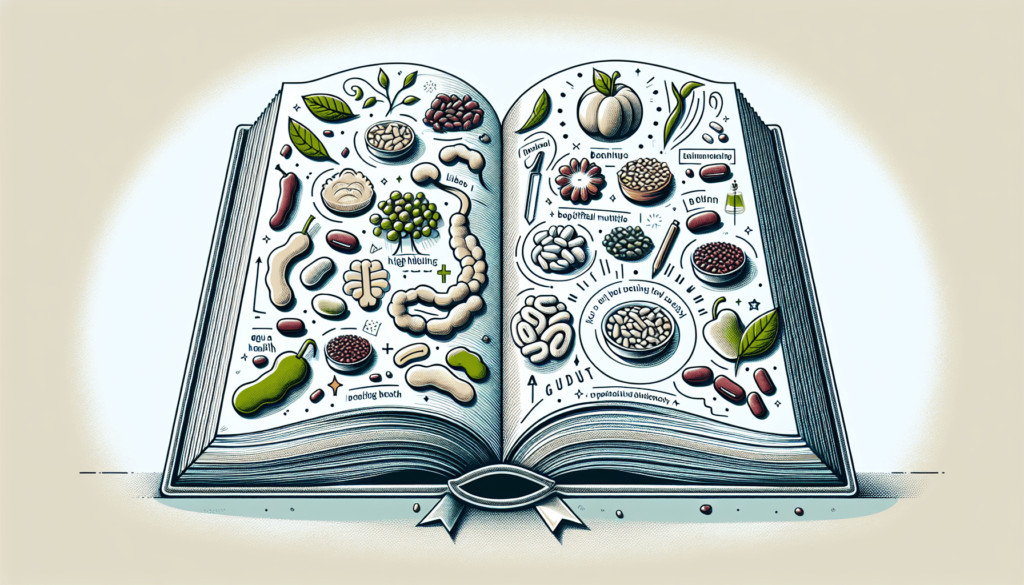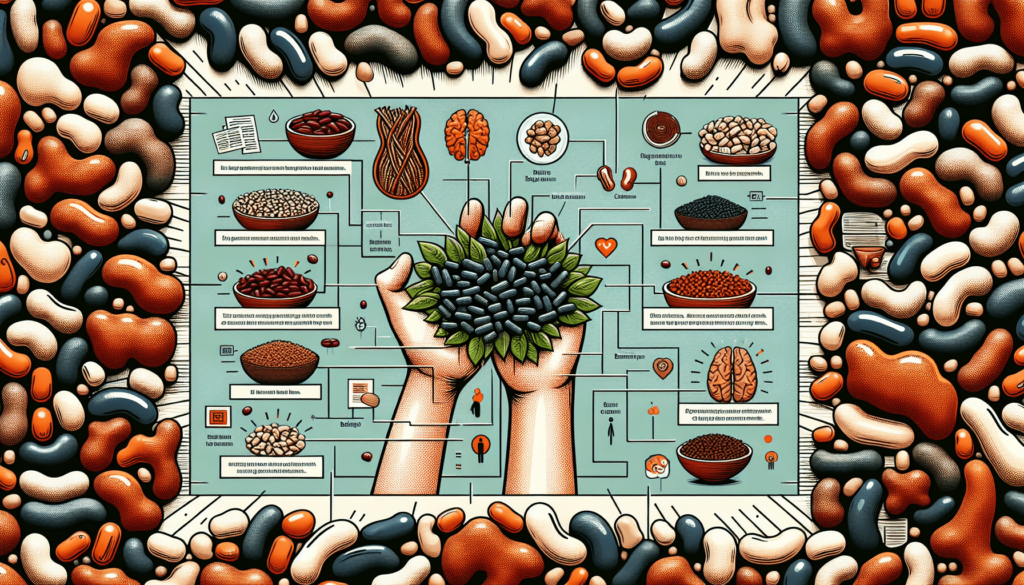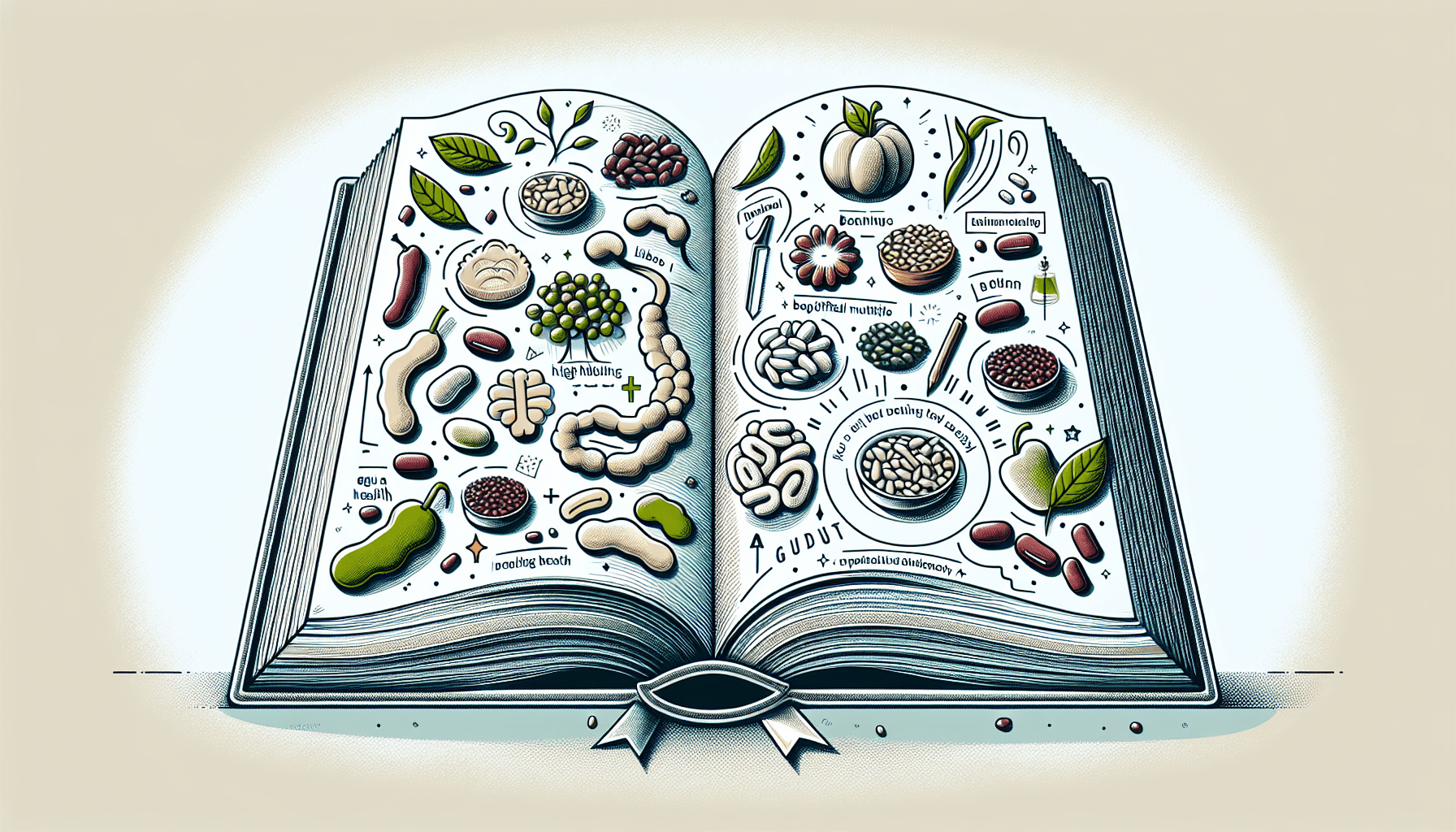Have you ever wondered how beans can positively impact your gut health and digestion? In this article, we will explore the various ways that beans can contribute to a healthy gut and efficient digestion. Whether you’re a fan of black beans, pinto beans, or kidney beans, you’ll be delighted to discover the numerous benefits these tiny legumes can bring to your overall well-being. From providing ample fiber to promoting the growth of beneficial gut bacteria, beans truly deserve a spot in your diet for an improved digestive system. So, let’s dive in and uncover the secrets of how beans nourish your gut and aid in digestion.
The Importance of Gut Health
Overview of gut health
Maintaining a healthy gut is crucial for overall well-being. The gut, also known as the digestive tract or gastrointestinal system, plays a vital role in digestion, nutrient absorption, and immune function. It consists of various organs, including the stomach, small intestine, and large intestine, all of which work together to break down food and extract essential nutrients.
Role of the gut microbiota
The gut is inhabited by trillions of microorganisms, collectively known as the gut microbiota. These microorganisms, including bacteria, fungi, and viruses, form a complex ecosystem that interacts with our bodies in numerous ways. They aid in digestion, produce beneficial compounds, and play a crucial role in maintaining a healthy immune system.
Benefits of a healthy gut
A healthy gut can have a profound impact on overall health and well-being. It is associated with improved digestion, enhanced nutrient absorption, a stronger immune system, and even mental health. Conversely, an imbalanced or disrupted gut microbiota, known as dysbiosis, can lead to various digestive disorders, compromised immune function, and increased susceptibility to diseases.
Nutritional Composition of Beans
Fiber content
Beans are an excellent source of dietary fiber. They are rich in both soluble and insoluble fiber, which play essential roles in maintaining a healthy digestive system. Soluble fiber absorbs water in the gut, forming a gel-like substance that helps slow down digestion and regulate blood sugar levels. Insoluble fiber, on the other hand, adds bulk to the stool and promotes regular bowel movements.
Protein content
Beans are an excellent plant-based source of protein, making them an ideal choice for individuals following a vegetarian or vegan diet. Protein is essential for various bodily functions, including tissue repair, hormone production, and muscle development. Incorporating beans into your diet can help meet your daily protein requirements while providing additional health benefits.
Vitamins and minerals in beans
Beans are packed with essential vitamins and minerals that support overall health. They are particularly rich in folate, iron, magnesium, and potassium. Folate is crucial for DNA synthesis and red blood cell production. Iron helps transport oxygen throughout the body, while magnesium and potassium regulate muscle and nerve function, maintain healthy blood pressure levels, and support bone health.

Effect of Beans on Gut Microbiota
Impact of beans on gut bacteria
Consuming beans can positively influence the composition of gut bacteria. Beans contain prebiotic fibers, which serve as a food source for beneficial bacteria in the gut. By nourishing these bacteria, beans promote the growth of a diverse and balanced gut microbiota, which is associated with improved digestion, enhanced immune function, and better overall health.
Fermentability of bean fibers
The fibers found in beans, particularly oligosaccharides such as raffinose and stachyose, are resistant to digestion in the small intestine. Instead, they reach the large intestine largely intact. Here, they are fermented by gut bacteria, producing beneficial compounds such as short-chain fatty acids (SCFAs). SCFAs provide energy for the cells lining the colon, promote a healthy gut environment, and have anti-inflammatory properties.
Production of short-chain fatty acids
The fermentation of bean fibers in the colon leads to the production of SCFAs, such as acetate, propionate, and butyrate. These SCFAs have numerous benefits for gut health. Acetate serves as an energy source for peripheral tissues, propionate helps regulate blood sugar levels, and butyrate is a preferred energy source for colonocytes, the cells lining the colon. Additionally, SCFAs have anti-inflammatory effects and help maintain a healthy gut barrier.
Promoting Bowel Regularity
Role of fiber in bowel movements
Fiber plays a crucial role in promoting regular bowel movements. It adds bulk to the stool, softens it, and helps ensure its smooth passage through the intestines. Insoluble fiber, found abundantly in beans, adds bulk to the stool, preventing constipation and supporting regularity. Soluble fiber, on the other hand, forms a gel-like substance that aids in maintaining proper stool consistency.
Beans as a natural laxative
The combination of fiber and oligosaccharides found in beans can act as a natural laxative. The insoluble fiber adds bulk to the stool, while the oligosaccharides are fermented by gut bacteria, stimulating bowel movements. This natural laxative effect can help alleviate constipation and promote regularity, ensuring a healthy and functioning digestive system.
Effect on constipation and diarrhea
Beans can be beneficial for individuals experiencing both constipation and diarrhea. In the case of constipation, the high fiber content helps soften the stool and promote regular bowel movements. On the other hand, when it comes to diarrhea, the soluble fiber in beans helps absorb excess water in the intestines, adding bulk and improving fecal consistency. This can help alleviate diarrhea symptoms and restore balance to the digestive system.

Reducing the Risk of Colon Cancer
Association between legume consumption and colon cancer
Consuming legumes, including beans, has been associated with a reduced risk of colon cancer. Legumes contain various compounds, such as fiber, antioxidants, and phytochemicals, that possess anti-carcinogenic properties and help protect against the development of cancerous cells in the colon. Regular consumption of beans as part of a balanced diet can provide valuable protection against colon cancer.
Protective effects of beans
Beans possess several properties that contribute to their protective effects against colon cancer. The high fiber content helps regulate bowel movements, reducing the contact time of potentially harmful substances with the colon lining. Furthermore, the presence of antioxidants in beans helps neutralize free radicals, which can damage cells and contribute to the development of cancer.
Antioxidant and anti-inflammatory properties
Beans are rich in antioxidants and anti-inflammatory compounds that can help reduce inflammation, oxidative stress, and DNA damage. Chronic inflammation and oxidative stress are known risk factors for the development of colon cancer. By consuming beans regularly, you can benefit from their natural antioxidant and anti-inflammatory properties, effectively reducing your risk of developing colon cancer.
Improving Digestive Health
Minimizing gastric acid secretion
Gastric acid secretion plays a crucial role in the digestion process, but excessive or imbalanced secretion can lead to gastrointestinal issues such as acid reflux and heartburn. The alkaline nature of beans can help balance gastric acid secretion, preventing excessive acidity and promoting a healthy digestive environment.
Alleviating gastrointestinal disorders
Beans have shown potential in alleviating various gastrointestinal disorders, such as irritable bowel syndrome (IBS) and inflammatory bowel disease (IBD). The combination of fiber, oligosaccharides, and beneficial compounds in beans can help soothe inflammation, promote healthy gut bacteria, and alleviate symptoms associated with these conditions. However, individual tolerance may vary, and it is essential to monitor your body’s response.
Relieving symptoms of irritable bowel syndrome
Many individuals with irritable bowel syndrome struggle with symptoms such as abdominal pain, bloating, and altered bowel habits. Incorporating beans into the diet can help alleviate these symptoms. The fiber content in beans helps regulate bowel movements, while the fermentation of oligosaccharides produces SCFAs, which have anti-inflammatory effects and improve the overall health of the gut.
Managing Blood Sugar Levels
Impact of beans on glycemic index
The glycemic index (GI) is a measure of how quickly a carbohydrate-containing food raises blood sugar levels. Beans have a relatively low GI, which means they cause a slower and more gradual rise in blood glucose compared to high-GI foods. This slow release of glucose into the bloodstream helps regulate blood sugar levels and can be particularly beneficial for individuals with diabetes.
Beneficial effects for individuals with diabetes
For individuals with diabetes, managing blood sugar levels is of utmost importance. The fiber and protein content in beans contribute to their low GI and can help stabilize blood glucose levels. Moreover, the presence of soluble fiber in beans enhances insulin sensitivity, improving the body’s ability to utilize glucose effectively.
Slow release of glucose into the bloodstream
Due to their low GI and high fiber content, beans promote a slow release of glucose into the bloodstream. This slow and steady release helps prevent blood sugar spikes and crashes, offering a more stable and sustained source of energy. By incorporating beans into your diet, you can better manage blood sugar levels and support overall metabolic health.
Preventing Gut Inflammation
Anti-inflammatory properties of beans
Chronic inflammation in the gut can contribute to the development of various digestive disorders. Beans possess anti-inflammatory properties due to their content of antioxidants, flavonoids, and other bioactive compounds. These compounds help reduce inflammation in the digestive tract, promote gut healing, and protect against conditions such as inflammatory bowel disease (IBD).
Reducing gut permeability
Increased gut permeability, also known as “leaky gut,” is associated with chronic inflammation and various health issues. The fiber and oligosaccharides found in beans can promote a healthy gut lining and reduce gut permeability. By improving the integrity of the gut barrier, beans help prevent the entry of harmful substances into the bloodstream and reduce the risk of systemic inflammation.
Potential protective effects against inflammatory bowel diseases
Inflammatory bowel diseases, such as Crohn’s disease and ulcerative colitis, are characterized by chronic inflammation in the digestive tract. Consuming beans regularly may offer protective effects against these conditions. The anti-inflammatory properties of beans, combined with their fiber content and ability to nourish beneficial gut bacteria, contribute to a healthier gut environment and may help alleviate symptoms of inflammatory bowel diseases.
Enhancing Nutrient Absorption
Phytic acid content in beans
Beans contain a compound called phytic acid, which can interfere with the absorption of certain minerals, such as iron, zinc, and calcium. Phytic acid binds to these minerals, forming complexes that are not easily absorbed by the body. While phytic acid can limit nutrient availability, it is also a potent antioxidant and may offer health benefits when consumed in moderation.
Effect on mineral absorption
To enhance nutrient absorption from beans, it is essential to employ strategies that reduce phytic acid content and enhance mineral availability. Soaking, fermenting, and sprouting beans can significantly reduce phytic acid levels, making minerals more bioavailable. Combining beans with vitamin C-rich foods, such as citrus fruits, can also enhance iron absorption.
Strategies to reduce phytic acid and enhance nutrient availability
To maximize nutrient absorption from beans, consider soaking them overnight before cooking. This soaking process helps reduce phytic acid levels, making minerals more accessible. Fermenting beans can also be beneficial, as it enhances nutrient availability and promotes the growth of beneficial bacteria. Additionally, sprouting beans before consumption can further reduce phytic acid content and increase enzyme activity.
Including Beans in a Digestive-Friendly Diet
Incorporating beans into meals
There are countless ways to incorporate beans into your meals and reap their digestive benefits. From adding them to soups, stews, and chili to using them as a filling in burritos and tacos, beans can be a versatile and nutritious addition to any dish. Experiment with different recipes and variations to discover your favorite ways to enjoy beans.
Pairing beans with other gut-friendly foods
To enhance the digestive benefits of beans, consider pairing them with other gut-friendly foods. Combining beans with vegetables, such as leafy greens and cruciferous vegetables, provides a wide range of nutrients and supports a healthy gut microbiota. Including fermented foods, such as sauerkraut or kimchi, can also enhance the diversity of beneficial gut bacteria.
Tips for easier digestion
While beans offer numerous digestive benefits, some individuals may experience discomfort or bloating after consuming them. To ease digestion, consider soaking beans overnight before cooking to reduce their oligosaccharide content. Additionally, rinsing canned beans thoroughly can help remove excess salt and potential gas-inducing compounds. Gradually increasing your bean intake and chewing them thoroughly can also aid in digestion.
Incorporating beans into your diet can significantly contribute to gut health and digestion. From promoting bowel regularity to reducing the risk of colon cancer and enhancing nutrient absorption, the numerous benefits of beans make them an excellent addition to a digestive-friendly diet. So why not start incorporating beans into your meals today and reap the rewards of a healthy gut?

